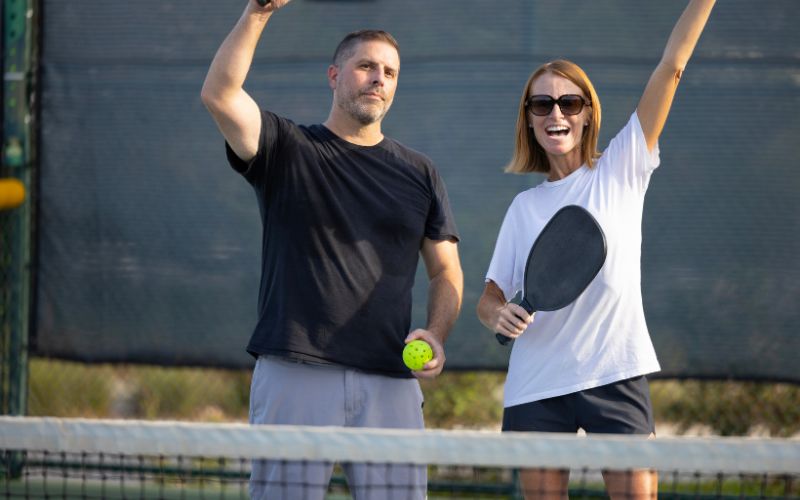Pickleball, America’s newest racquet sport, has captured the hearts of millions with its dynamic gameplay and inclusive nature. But how long has pickleball been around? Delving into its fascinating history reveals a tale of innovation, camaraderie, and the quest for wholesome recreation.
Pickleball History: The Genesis of Pickleball
Pickleball traces its roots back to the mid-1960s when pickleball was invented by Joel Pritchard, Bill Bell, and Barney McCallum. The game emerged as a solution to provide wholesome entertainment for their families during a summer afternoon on Bainbridge Island, Washington.
Why Was It Called Pickleball?
So, what’s the story behind the curious name “pickleball”? The popular narrative suggests that the name originated from the Pritchard family’s dog, Pickles, who supposedly chased the ball during their games.
However, in 2021, Wayne Dollard, from Pickleball Magazine, embarked on a quest to uncover the authentic history behind the name. Surprisingly, his research revealed a different account.
It turns out that the anecdote about the dog was more of a lighthearted tale that evolved into accepted truth over time. Pickles the dog didn’t enter the picture until years later, and interestingly, he was named after the sport rather than the other way around.
To grasp the true origins of the name, it’s essential to understand the cultural context of the era, particularly within the affluent community of Seattleites and their summer retreats on Bainbridge Island.
Within this social circle, rowing held significant popularity, with Joan Pritchard, Joel’s wife, being an avid follower of regattas since her college days.
In the realm of college rowing, the term “pickle boat” or “pickup boat” referred to a crew composed of leftover rowers, essentially a team assembled from non-starters across different teams.
When the Pritchards improvised a game using equipment from various sports, Joan drew a parallel to the concept of a pickle boat race. And thus, “pickleball” acquired its distinguished name, inspired by the rowing terminology and the spirit of impromptu recreation.
A Game Born of Innovation: Evolution and Growth
The First Game
Legend has it that the first time they played pickleball was on an old badminton court with makeshift equipment, including table tennis paddles and a plastic ball resembling a softball-sized wiffle ball. The simplicity of the setup belied the excitement and thrill that ensued as the game took shape.
From Backyard Game to Competitive Sport
What began as a simple backyard game soon gained popularity among friends and neighbors. Pickleball’s appeal spread rapidly, with the first pickleball tournaments emerging in local communities. As word of the exciting new sport spread, enthusiasts began establishing the first permanent pickleball court to accommodate the growing demand.
The Inception of Pickleball Regulations
McCallum expressed enthusiasm for the novel game and initiated discussions with both Bell and Pritchard regarding the potential rules governing pickleball.
Their collective aspiration was for pickleball to uphold the essence of badminton, ensuring that the rules remained faithful to its foundational principles. As a result, the regulations governing pickleball today draw significant inspiration from the gameplay mechanics of badminton.
However, the rules were intentionally designed to be straightforward, ensuring that families could easily grasp how to play. This simplicity was central to the essence of pickleball, aiming to provide enjoyment for the entire family—an enduring ethos that has contributed to its remarkable proliferation.
The Early Reception of the Game
Pickleball swiftly gained traction in the Pacific Northwest region, and soon thereafter, its popularity burgeoned across the nation. The sport found a particularly enthusiastic following among retirees and individuals seeking a low-impact means of staying active. As pickleball’s popularity surged, inquiries arose regarding the origin of its distinctive name.
Several narratives exist regarding the etymology of pickleball’s name. One prevalent hypothesis suggests that it was christened after Joel Pritchard’s dog, Pickles, known for its penchant for chasing after the ball during matches. Another theory posits that the name derived from the term “pickle boat,” which denotes a vessel comprising surplus rowers from other boats. Regardless of the true genesis of its name, pickleball has undeniably evolved into a cherished pastime embraced by millions worldwide.
Pickleball’s Rise to Prominence
The Role of Organizations
The establishment of the USA Pickleball Association (USAPA) in 1984 marked a significant milestone in pickleball’s journey. The USAPA played a pivotal role in standardizing rules, organizing tournaments, and promoting the sport’s growth on a national and international scale. The sport’s visibility received a boost through media coverage and features in publications like Pickleball Magazine and Tennis Magazine.
The Surge in Popularity of Pickleball
As pickleball’s popularity has surged, its visibility in the media has expanded as well. The sport has been showcased on television, in publications, and across various online platforms, contributing to the dissemination of its appeal to a broader audience.
According to information from USA Pickleball, the earliest documented article about pickleball traces back to the year 1975.
In addition to media coverage, pickleball tournaments have emerged as a favored pastime for individuals of all ages and proficiency levels. Many parks and recreational facilities now feature dedicated pickleball courts, facilitating accessibility for enthusiasts eager to explore the sport.
Moreover, the conversion of tennis courts to accommodate pickleball lines and full courts has become increasingly prevalent. In personal observation, it’s not uncommon to witness deserted tennis courts juxtaposed with bustling pickleball courts, particularly in areas like Raleigh.
Pickleball serves as an excellent avenue for social engagement, with numerous players establishing clubs and leagues to engage with fellow enthusiasts. These community-oriented groups foster a sense of belonging and camaraderie among participants, contributing significantly to the burgeoning popularity of the sport.
International Recognition
Pickleball’s popularity transcended national borders, captivating enthusiasts across continents. The sport found its way into international competitions and garnered recognition from professional pickleball associations and organizations like the International Federation of Pickleball. Its inclusion in prestigious events such as the Huntsman World Senior Games underscored pickleball’s status as a legitimate and exciting sport for players of all ages.
The Continuing Legacy
As pickleball continues to evolve, its allure remains undiminished. The game’s adaptability and inclusivity make it accessible to players of varying skill levels and backgrounds. Whether played casually in local communities or competitively on the global stage, pickleball’s essence as a source of fun, fitness, and friendship endures.
Conclusion: A Journey of Innovation and Joy
Pickleball’s journey from its humble beginnings to becoming one of the fastest-growing sports in the world is a testament to human ingenuity and the pursuit of wholesome recreation. As players gather on pickleball courts worldwide, they partake in a tradition that spans generations—a tradition fueled by the spirit of camaraderie, competition, and sheer enjoyment.
In answering the question of how long pickleball has been around, we discover not just a timeline of events but a story of passion, perseverance, and the power of play. So, whether you’re a seasoned pro or a newcomer to the game, remember that each serve, volley, and rally contributes to the rich tapestry of pickleball’s history.
FAQs: Unveiling the History of Pickleball: How Long Has Pickleball Been Around?
1. What is the origin of pickleball?
Pickleball originated in the mid-1960s when Joel Pritchard, Bill Bell, and Barney McCallum invented the game as a recreational activity for their families on Bainbridge Island, Washington.
2. How did pickleball get its name?
The name “pickleball” has several origin stories. One theory suggests it was named after Joel Pritchard’s dog, Pickles, while another proposes that it derived from the term “pickle boat” used in rowing. However, recent research suggests that the dog story might be more of a lighthearted tale than historical fact.
3. What contributed to pickleball’s rapid growth in popularity?
Pickleball’s inclusivity and accessibility played pivotal roles in its burgeoning popularity. Its appeal to people of all ages and fitness levels, along with its emphasis on family-friendly fun, helped it spread rapidly across communities.
4. How has pickleball’s presence expanded in the media?
Pickleball has gained visibility through television coverage, magazine features, and online platforms. The first published article about pickleball dates back to 1975, highlighting its enduring presence in the media.
5. Is pickleball a global phenomenon?
Yes, pickleball has transcended national borders and gained recognition on the international stage. With the establishment of organizations like the USA Pickleball Association and its inclusion in prestigious events, pickleball has become a beloved sport enjoyed by enthusiasts worldwide.







